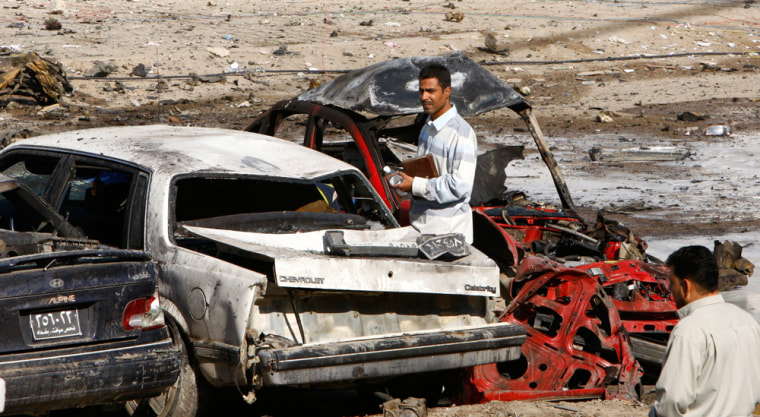An Iraqi soldier Wednesday sprayed automatic weapons fire at U.S. soldiers at an Iraqi military base in Mosul, killing two and wounding six before he died in a hail of bullets, an American general said.
In Baghdad, bombers struck the capital for a third straight day, killing 23 people and wounding scores in a string of attacks in mostly Shiite areas. The U.S. military said dozens were injured but it couldn't confirm any fatalities.
Maj. Gen. Mark Hertling, commander of U.S. forces in northern Iraq, told The Associated Press the "premeditated" attack occurred in a courtyard as the soldiers waited for their two lieutenants to finish a meeting with an Iraqi army company commander.
Hertling, who said he had spoken with some of the wounded troops, disputed Iraqi accounts that the shooting followed a heated argument between the Iraqi soldier and the Americans.
Hertling said the attacker strolled into the courtyard carrying a Kalashnikov rifle and a drum of ammunition, walked to a corner, turned and opened fire.
"One shot was aimed and the rest was literally a spray," he said. "There was no argument, no spitting, no slapping, none of that occurred."
Previous shooting in Mosul
The six wounded American soldiers were expected to recover, Hertling said.
He said senior Iraqi army and police commanders in Mosul, 225 miles northwest of Baghdad, had expressed regret over the shooting and promised a joint investigation.
In Baghdad, Iraqi Defense Ministry spokesman Maj. Gen. Mohammed al-Askari said the shooting followed a quarrel at an Iraqi base in a volatile Sunni Arab neighborhood in central Mosul. The Iraqi soldier was identified as Barzan al-Hadidi.
It was the second such shooting in Mosul in a year, raising questions about the professionalism and preparedness of Iraqi security forces and their relations with their American partners.
Last December, an Iraqi soldier allegedly shot and killed a U.S. captain and a sergeant during a joint operation in Mosul, where al-Qaida and other Sunni insurgent groups still operate.
Tensions are running high in Mosul, where U.S. and Iraqi troops have been trying since last spring to rout insurgents from Iraq's third largest city. The military campaign has also raised friction between the Arab population and Kurdish soldiers of the Iraqi army sent there to help restore order.
Also in Mosul, two Christian sisters were killed and their mother was wounded in an attack on their home Wednesday, police said. The attackers rigged the house with boobytraps and one Iraqi policeman was injured when he came to investigate the slayings, Hertling said.
Suicide bombings continue
As violence raged in Mosul, a string of bombings rocked Baghdad for the third consecutive day, killing 23 people and wounding about 90, police said. The Iraqi army acknowledged the rise in attacks and said it was taking measures to curb "the increasing number of terrorist attacks" in the city.
Military spokesman Maj. Gen. Qassim al-Moussawi said the measures would include stepped up intelligence gathering and pre-emptive strikes on suspected extremists.
The first car bomb blew up in a bustling mostly Shiite section of downtown Baghdad during the Wednesday morning rush hour, killing four people and injuring 15.
A second car bomb exploded near a school in the Shiite-dominated neighborhood of Shaab in north Baghdad. Iraqi police said five people were killed and 12 wounded. A roadside bomb wounded seven people in another part of Shaab, police said.
Two bombs blew up within moments of each other in the evening in the mostly Shiite district of New Baghdad, with the second explosion occurring just after police arrived to investigate the first.
It was not immediately clear how many were killed in each explosion, but police and hospital officials gave an initial toll of 14 dead, including three children and two women.
Hassan Rahim, a 42-year-old barber who lives in the neighborhood, heard the blasts as he fixed his rooftop satellite dish.
"I do not know why Iraqi officials keep talking about the improving security in Baghdad everyday. We are fed up with such lies and we will hope that the security file in the capital will not be handed over to Iraqi government," he said.
Recent spike in attacks
Wednesday's attacks follow two days of rush-hour blasts in Baghdad that have killed more than 30 people and wounded some 70 others. The violence underscores the challenge facing the Iraqi security forces as they take a leading role in providing security and the U.S. military pulls back.
The recent uptick in bombings was a setback to security gains that led to violence dropping sharply in recent months in the capital.
In the first nine days of November, there were at least 19 bombings in Baghdad, compared with 28 for all of October and 22 in September, according to an Associated Press tally.
The rise in attacks also comes as U.S. and Iraqi officials try to hammer out a final agreement on a security deal that would keep U.S. troops in Iraq until the end of 2011. Parliament must approve the deal by the end of the year when the U.N. mandate authorizing the U.S. presence expires.
But the proposed agreement has drawn sharp criticism, especially within the majority Shiite community. Without an agreement or a new mandate, the U.S. military would have to cease operations in Iraq.
Iraq's two neighbors Syria and Iran have also spoken out against the agreement. The U.S. accuses both countries of supporting or harboring Iraqi extremists opposed to the U.S.-backed government of Prime Minister Nouri al-Maliki.
Moreover, an Internet monitoring service reported Tuesday that 10 Iraqi insurgent groups have agreed to escalate attacks against U.S. and Iraqi forces to derail the proposed deal, which they branded "the agreement of disgrace."
